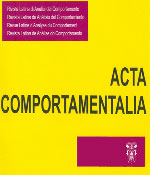Effects of an educative board game on the acquisition of reading and writing
DOI:
https://doi.org/10.32870/ac.v18i2.27993Keywords:
Jogo, CRMTS, equivalência de estímulos, controle por unidades mínimas, leitura recombinativaAbstract
This work investigates whether the use of a board game, which makes possible to teach the relationships between the printed word, a group of syllables, pictures, handwritten and spoken word, leads to the reading and writing of taught words (teaching words) and new words formed by the recombination of syllables from these words (generalization words). Nine children aged 5 and 6 participated in the study. The work was realized in 5 stages (Pre-test, Intervention, Investigation, Post -test, and Follow-up). During the Pre-test, the relationships between the printed word and the word spoken by the child, between the spoken word and the group of syllables, the spoken word and the handwritten word and between the written word and the picture were tested. Next, 15 board game sessions were conducted. Finally, these same relationships were once again evaluated (Investigation and Final Post test). In regards to teaching words, results showed an increase in the number of words read correctly, syllables selected correctly, picture and words matched correctly and syllables written correctly. As for the generalization words, there was an increase in number of syllables selected correctly.Downloads
Download data is not yet available.
Downloads
Published
2011-10-11
How to Cite
Regina de Souza, S., & Hübner, M. (2011). Effects of an educative board game on the acquisition of reading and writing. Acta Comportamentalia, 18(2). https://doi.org/10.32870/ac.v18i2.27993
Issue
Section
Articles
License

<a rel="license" href="http://creativecommons.org/licenses/by-nc-sa/4.0/"><img alt="Licencia de Creative Commons" style="border-width:0" src="https://i.creativecommons.org/l/by-nc-sa/4.0/88x31.png" /></a><br />Este obra está bajo una <a rel="license" href="http://creativecommons.org/licenses/by-nc-sa/4.0/">licencia de Creative Commons Reconocimiento-NoComercial-CompartirIgual 4.0 Internacional</a>.






